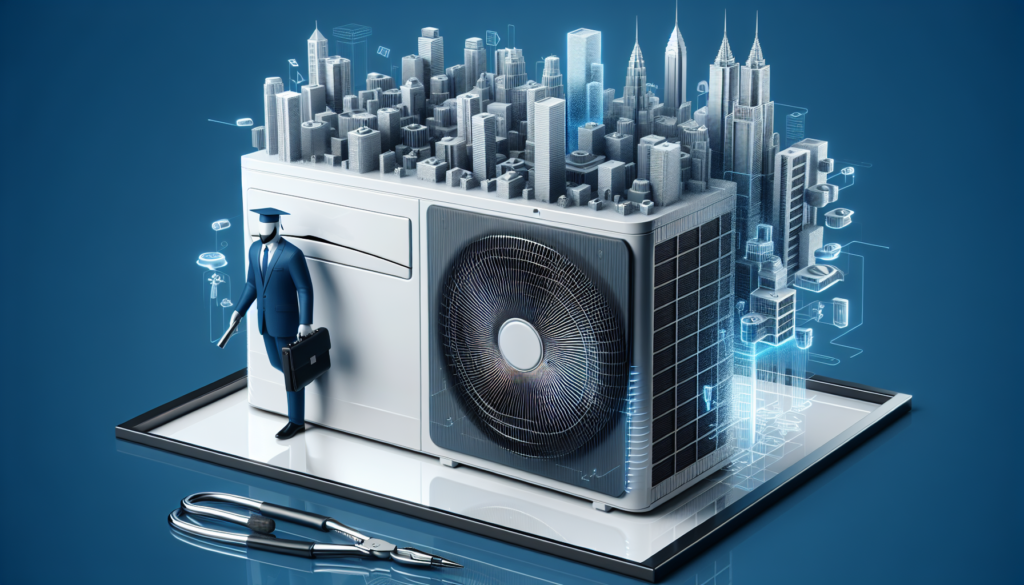Are you a fresh graduate looking for exciting opportunities in the HVAC industry? Look no further! In our article, “Entry-level HVAC Jobs: Opportunities for Freshers,” we explore the vast array of possibilities that await you in this thriving field. From gaining hands-on experience to building a solid foundation for your career, we’ll show you why entry-level HVAC jobs are the perfect stepping stone for ambitious individuals like yourself. So, buckle up and get ready to embark on an exciting journey into the world of HVAC!
Entry-level HVAC Jobs: Opportunities for Freshers
Are you considering a career in the HVAC industry? If you’re a fresher looking for a rewarding and promising career path, entry-level HVAC jobs can be a great starting point. The HVAC industry offers a wide range of opportunities for individuals with the right skills, education, and certification. In this article, we will provide you with a comprehensive overview of entry-level HVAC jobs, the importance of these roles, the required education and certification, the skills and qualifications needed, the different types of entry-level HVAC jobs available, the job roles and responsibilities, salary expectations, job search strategies for freshers, and the growth and advancement opportunities in the field.

1. Overview of HVAC Industry
1.1 What is HVAC?
HVAC stands for Heating, Ventilation, and Air Conditioning. It refers to the technology and systems used to control indoor environmental conditions, including temperature, humidity, and air quality. HVAC systems are crucial in maintaining comfortable and healthy living and working spaces in residential, commercial, and industrial buildings.
1.2 Current Market Scenario
The HVAC industry is experiencing significant growth due to factors like population growth, increasing urbanization, and the need for energy-efficient and sustainable solutions. The demand for HVAC systems and services is driven by the need for comfortable indoor environments and the increasing awareness of energy conservation.
1.3 Industry Growth and Projections
According to industry reports, the global HVAC market is expected to reach a value of $367.5 billion by 2025, with a compound annual growth rate (CAGR) of 6.6% from 2020 to 2025. This growth indicates a promising future for individuals considering a career in the HVAC industry, especially in entry-level roles.
2. Importance of Entry-level HVAC Jobs
2.1 Entry-level HVAC Jobs as a Stepping Stone
Entry-level HVAC jobs provide an excellent opportunity for freshers to enter the industry and gain valuable experience. These roles serve as a stepping stone for career progression, allowing individuals to learn the fundamental skills and knowledge required for higher-level positions in the future.
2.2 Contributing to Essential Services
HVAC systems play a crucial role in maintaining a comfortable and healthy indoor environment. Whether it’s heating systems in the winter or cooling systems in the summer, HVAC technicians ensure that homes, businesses, and public spaces have the necessary heating, ventilation, and air conditioning for people to live and work comfortably.
2.3 Gaining Practical Experience
Entry-level HVAC jobs offer freshers a hands-on experience in the field. By working on installation, maintenance, and repair projects, individuals can develop practical skills and gain a deeper understanding of HVAC systems. This practical experience is invaluable for career growth and advancement opportunities within the industry.
3. Required Education and Certification
3.1 High School Diploma or Equivalent
Typically, a high school diploma or equivalent is the minimum educational requirement for entry-level HVAC jobs. This ensures that individuals have a basic level of education and the necessary foundation to pursue further training and certification in the HVAC field.
3.2 HVAC Certification Programs
To enhance your knowledge and skills in HVAC systems, it is beneficial to complete a certification program. These programs cover topics such as refrigeration, electrical work, heating and cooling systems, and installation and repair techniques. Certification programs can be completed at vocational schools, community colleges, or trade schools.
3.3 Licensing Requirements
Depending on the jurisdiction or state, HVAC technicians may be required to obtain a license to practice legally. Licensing requirements vary, but they often involve passing an examination that tests the technician’s knowledge and understanding of HVAC systems and safety regulations. It’s important to research and comply with the licensing requirements specific to your region.
3.4 Ongoing Continuing Education
The HVAC industry is constantly evolving, with new technologies and regulations being introduced regularly. To stay up-to-date with industry trends and advancements, HVAC professionals should pursue ongoing continuing education. This can include attending workshops, seminars, and conferences, as well as taking advantage of online learning resources.
4. Skills and Qualifications for Entry-level HVAC Jobs
4.1 Technical Knowledge of HVAC Systems
Entry-level HVAC jobs require a strong foundation in the technical aspects of HVAC systems. This includes understanding how heating, ventilation, and air conditioning systems work, as well as being familiar with different types of equipment, tools, and materials used in the field.
4.2 Problem-solving and Analytical Skills
HVAC technicians often encounter complex problems that require critical thinking and problem-solving skills. Being able to analyze system issues, troubleshoot problems, and devise effective solutions is essential in this field.
4.3 Physical Stamina and Dexterity
Entry-level HVAC jobs can be physically demanding, requiring technicians to work in various environments and perform tasks that involve lifting, bending, and standing for extended periods. Having good physical stamina and dexterity is necessary to meet the demands of the job.
4.4 Attention to Detail
Attention to detail is crucial in HVAC work to ensure proper installation, maintenance, and repair of systems. Technicians must be thorough in their inspections, follow safety protocols, and be diligent in documenting their work.
4.5 Communication and Customer Service Skills
HVAC technicians often interact with clients or customers, explaining system issues, providing recommendations, and offering solutions. Strong communication and customer service skills are essential to build rapport, effectively communicate technical information, and ensure customer satisfaction.
4.6 Health and Safety Awareness
Working with HVAC systems involves handling potentially hazardous materials, electrical components, and working at heights or in confined spaces. Entry-level HVAC technicians must have a strong awareness of health and safety protocols to protect themselves and others in the workplace.

5. Types of Entry-level HVAC Jobs
5.1 HVAC Technician
HVAC technicians are responsible for the installation, maintenance, and repair of heating, ventilation, and air conditioning systems. They diagnose system issues, perform routine inspections, replace faulty components, and ensure the proper functioning of HVAC systems.
5.2 HVAC Installer
HVAC installers focus primarily on installing new HVAC systems. They follow blueprints, design specifications, and manufacturer instructions to install various components and ensure the system is properly connected and functional.
5.3 HVAC Maintenance Technician
Maintenance technicians specialize in conducting routine inspections and preventative maintenance of HVAC systems. They clean and lubricate components, perform system tests, identify potential issues, and make recommendations for repairs or replacements.
5.4 HVAC Apprentice
An HVAC apprentice is an entry-level position that involves working under the guidance of experienced technicians to gain practical hands-on experience. Apprentices assist in installation, maintenance, and repair tasks while learning from experienced professionals.
5.5 HVAC Customer Service Representative
HVAC customer service representatives focus on providing excellent customer service and support. They handle inquiries, schedule appointments, coordinate dispatching of technicians, and ensure customer satisfaction throughout the service process.
6. Job Roles and Responsibilities
6.1 HVAC Technician
As an HVAC technician, your responsibilities may include diagnosing and repairing system issues, performing routine maintenance, installing new systems, and ensuring compliance with safety regulations. You may also handle customer interactions, provide recommendations, and keep detailed records of your work.
6.2 HVAC Installer
As an HVAC installer, your primary role is to install new HVAC systems. This involves reading blueprints and design specifications, assembling and connecting system components, and testing the system to ensure proper functionality. You are responsible for following installation procedures and ensuring compliance with industry standards.
6.3 HVAC Maintenance Technician
As a maintenance technician, your responsibilities involve conducting routine inspections, cleaning and lubricating system components, performing system tests, and identifying potential issues. You may also assist in repairs and replacements as needed and provide recommendations for improving system efficiency.
6.4 HVAC Apprentice
As an HVAC apprentice, your role is to assist experienced technicians in various tasks such as installing, maintaining, and repairing HVAC systems. You will learn from experienced professionals, gain practical hands-on experience, and gradually develop the necessary skills to become an independent HVAC technician.
6.5 HVAC Customer Service Representative
As an HVAC customer service representative, your primary responsibility is to provide excellent customer service to clients. This involves handling inquiries, scheduling appointments, coordinating technicians’ dispatch, and ensuring efficient and satisfactory service delivery. You will be the point of contact for customers throughout the service process.
7. Salary Expectations
7.1 Factors Influencing Salary
Several factors influence the salary you can expect in entry-level HVAC jobs, including your location, level of education and certification, years of experience, and the specific job role and responsibilities. Additionally, the demand for HVAC services in your area and the size and reputation of the company you work for can also impact your salary.
7.2 Average Salary Range for Entry-level HVAC Jobs
On average, entry-level HVAC technicians can expect to earn a salary range of $30,000 to $40,000 per year. This can vary depending on the factors mentioned above. As you gain experience and advance in your career, your salary is likely to increase.
7.3 Salary Growth Potential
The HVAC industry offers excellent opportunities for salary growth and advancement. With further education, certification, and experience, you can qualify for higher-level positions that offer competitive salaries. Specializing in specific areas or taking on supervisory or management roles can also contribute to increased earning potential.
8. Job Search Strategies for Freshers
8.1 Resume Preparation and Cover Letter
When applying for entry-level HVAC jobs, it’s important to prepare a well-crafted resume that highlights your education, certifications, any relevant experience, and your skills and qualifications. Additionally, a cover letter personalized to the position you’re applying for can help you stand out among other applicants.
8.2 Networking and Internships
Networking within the HVAC industry can open doors to job opportunities. Attend industry events, join professional associations, and consider internships or apprenticeship programs to gain valuable connections and experience. Networking can provide valuable insights, recommendations, and potential job leads.
8.3 Job Boards and Online Platforms
Utilize job boards and online platforms that specialize in HVAC job listings. Websites like Indeed, Monster, and LinkedIn can be great resources for finding entry-level positions. Set up job alerts to receive notifications about new job postings that match your criteria.
8.4 Industry Associations and Trade Shows
Industry associations and trade shows are excellent resources for job seekers in the HVAC industry. These events bring together professionals, companies, and potential employers. Attend trade shows, participate in workshops or seminars, and engage with industry experts to expand your professional network and explore job opportunities.
9. Training and Apprenticeship Programs
To enhance your skills and knowledge in the HVAC field, consider enrolling in training programs or apprenticeships. These programs provide hands-on experience, mentorship, and the opportunity to learn from experienced professionals. Look for vocational schools, community colleges, or trade organizations that offer relevant programs in your area.
10. Growth and Advancement Opportunities
10.1 Continuing Education and Certification
Continuing education and pursuing additional certifications can open doors for growth and advancement in the HVAC industry. As technology and regulations evolve, staying updated on the latest advancements is essential. By pursuing higher-level certifications and specialized training, you can position yourself for more advanced roles and higher pay scales.
10.2 Specialization and Niche Markets
Specializing in specific areas of HVAC systems can lead to niche market opportunities. These can include areas like energy efficiency, green technologies, or specialized industrial HVAC systems. Becoming an expert in a particular field can set you apart from other professionals and lead to increased job prospects and potentially higher earnings.
10.3 Supervisory and Management Roles
With experience and demonstrated leadership abilities, you can advance into supervisory or management roles within the HVAC industry. These roles involve overseeing a team of technicians, managing projects, coordinating schedules, and ensuring efficient operation in a managerial capacity.
10.4 Entrepreneurial Opportunities
For individuals with an entrepreneurial spirit, starting your own HVAC business can be a viable option. This path requires a combination of technical expertise, business acumen, and strong customer service skills. Running your own HVAC business allows you the freedom to set your own rates, manage your workload, and potentially earn a higher income.
In conclusion, entry-level HVAC jobs offer freshers an exciting and promising career path. With the right education, certification, and skills, you can embark on a journey towards a fulfilling and rewarding career in the HVAC industry. Whether you choose to specialize in a specific area, advance into management roles, or start your own business, the growth and advancement opportunities in the field are abound. So, if you’re passionate about technology, enjoy working with your hands, and want to contribute to creating comfortable and healthy indoor environments, consider exploring the entry-level HVAC job opportunities available to freshers.

